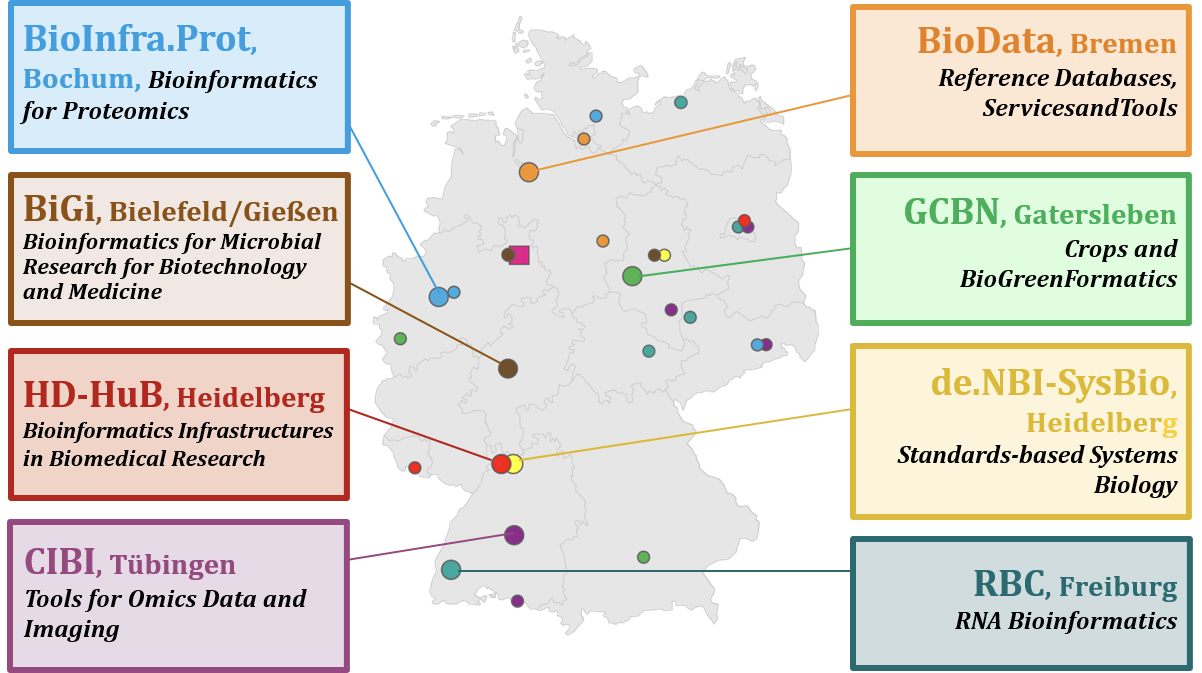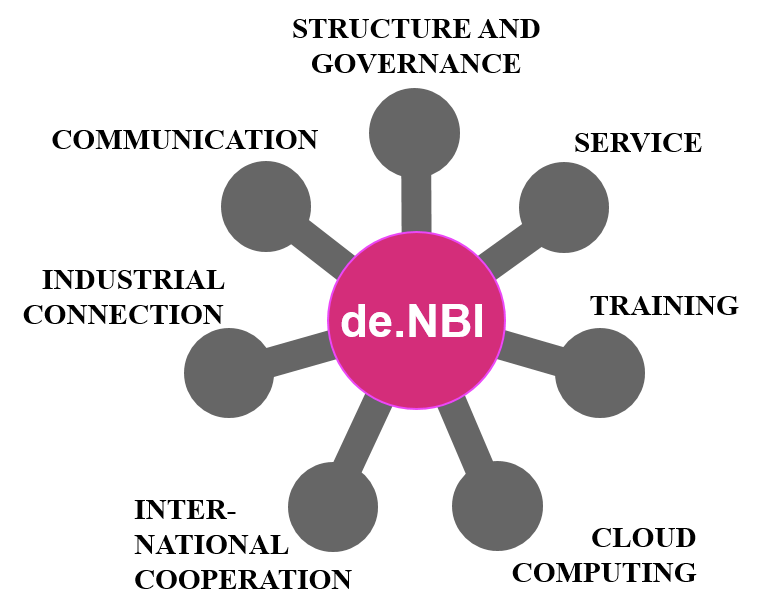In this article, I will first outline the events that led to the establishment of the German Network for Bioinformatics Infrastructure (de.NBI). The establishment of the de.NBI network was made possible through a project of the German Federal Ministry of Education and Research (BMBF), which envisioned several task areas for the network. I will present in detail the task areas that are most important for the bioinformatics infrastructure, such as service, training, cloud computation, international collaboration, and industrial connection, and the successes achieved through these tasks. Finally, I will briefly describe the process that enabled the de.NBI network to be sustained.
The history of the de.NBI network
The development of the German Network for Bioinformatics Infrastructure was initiated by the Bioeconomy Council in 2012. As an independent advisory body to the German government, the Bioeconomy Council deals with recommendations for action to implement the national bioeconomy strategy. The question of whether the bioinformatics established in Germany sufficiently meets the requirements of academia and industry was investigated. This question was discussed within the Bioeconomy Council using the established methods, i.e. a workshop was held on the question raised and its results were written down in a recommendation. Since I was a member of the Bioeconomy Council at that time and had great interest in a powerful bioinformatics input, I agreed to coordinate the workshop and the subsequent statement.
During the preparation of the workshop, it became apparent that in Germany bioinformatics was available to a sufficient extent, but there was a relatively large gap when it came to satisfactory application in the life sciences. The real question to be addressed by a bioeconomy workshop was therefore how to build a bioinformatics infrastructure. The workshop had to consider two possible solutions. One solution path was to establish a new national institute for bioinformatics infrastructure, while the second solution path relied on a network construct. The second solution was chosen because it allowed the establishment of a bioinformatics infrastructure without delay. The basic building blocks of the network, namely potent bioinformatics groups, were sufficiently available and only needed to be networked.
The Bioeconomy Council's statement entitled "Requirements for a Bioinformatics Infrastructure in Germany to Conduct Bioeconomy-Relevant Research" was convincing and the plan to establish a German Network for Bioinformatics Infrastructure was immediately included in the funding catalog of the BMBF. A BMBF project entitled "German Network for Bioinformatics Infrastructure - de.NBI" was announced, which gave all bioinformatics groups located in Germany the opportunity to participate in the establishment of the network. This network to be established was intended to enable experimental life scientists to analyze larger amounts of data. The approach of the BMBF to establish a network for bioinformatics infrastructure by means of a project proved to be a success story from the very beginning. The most powerful of the bioinformatics groups based in Germany participated in the project, which was announced by the BMBF. The establishment of the de.NBI network could thus be started at a high level.
Development, structure and scope of the de.NBI network
As can be seen in Fig. 1, the selection of network partners took place in two stages. After an initial selection of network partners in 2014, a further selection of so-called partner projects was made in 2016. A total of 40 partners were accepted into the de.NBI network and assigned to eight service centers. The distribution of the service centers in Germany and their thematic classification is shown in Fig. 2. The de.NBI network was to be managed by a coordinator with an administration office. Since I signaled that I would be available for such a coordinator role, I was appointed to this position by the BMBF. I carried out the tasks of the de.NBI coordinator from 2015 until the BMBF project ended in December 2021.
 Fig. 1: The timeline of the development of the de.NBI network.
Fig. 1: The timeline of the development of the de.NBI network.
 Fig. 2: de.NBI service centers in Germany. The lines point to the locations of the eight service centers (large circles). The smaller dots in the same color mark the partners of the respective service center. The location of the administration office is marked by a square.
Fig. 2: de.NBI service centers in Germany. The lines point to the locations of the eight service centers (large circles). The smaller dots in the same color mark the partners of the respective service center. The location of the administration office is marked by a square.
The various task areas of the de.NBI network are shown in Fig. 3. Service and training represent the basic tasks. In the service area, the various analysis programs for the evaluation of life science data are provided. In the training area, training courses are offered to teach users how to use the analysis programs and how to handle the results obtained.

Fig. 3: The task areas of the de.NBI network
International cooperation with established bioinformatics infrastructures, especially in Europe, is mentioned as a further task of the de.NBI network. This task could be fulfilled by the participation of Germany in the European ELIXIR network. ELIXIR bundles the nationally existing bioinformatics infrastructures in Europe. A contract was made between Germany and ELIXIR in 2016, which regulates the rights and obligations of the German ELIXIR node. The German ELIXIR node is based on the bioinformatics infrastructure implemented by the de.NBI network.
Another task of the de.NBI network is dedicated to the establishment of an adequate compute structure. In 2017 (Fig. 1), the federated de.NBI cloud consisting of initially five sites was launched for this purpose, enabling all researchers from the life sciences to analyze their research data free of charge. To use the de.NBI-Cloud, a simple application is required. Such an application is usually reviewed within a week and the requested computing and storage capacities are allocated. In the meantime, the de.NBI Cloud has become the largest academic cloud in Germany.
Collaboration between industrial companies and the de.NBI network is mediated by the de.NBI Industrial Forum. The Industrial Forum currently consists of more than 35 member companies, all of which work with life science data. Forum members have access to the achievements of the de.NBI network, e.g. they can preferentially participate in training events.
The last item to be mentioned in the de.NBI network's task areas is public relations. First and foremost, the de.NBI website (www.denbi.de) provides information about all events and activitites of the de.NBI network. The public is also informed via Twitter and LinkedIN. The de.NBI Quarterly Newsletter should also be mentioned, which summarizes the current events in a quarterly interval and thus describes the processes in the de.NBI network chronologically.
The successes of the de.NBI network
The presentation of the de.NBI network by means of its task areas facilitates the recognition of de.NBI successes. In the task area of structure and management, the de.NBI coordinator together with the de.NBI administration office succeeded in establishing a well-structured network. The establishment of a de.NBI steering group, in which one representative from each of the eight service centers and the coordinator had a seat, was helpful in this regard. This de.NBI steering committee, which met quarterly, decided on all issues related to the development and progress of the de.NBI network.
A total of about 150 software programs for the analysis of life science data are kept in the service area. These software programs are provided by groups that originally also carried out their development. The software programs offered are the basis for the training area.
The training area offers training courses that focus on the handling of the above-mentioned software programs. Furthermore, the handling of analysis results is also taught. In the training area, approx. 400 training courses have been carried out so far and more than 9,000 researchers from the life sciences have been trained.
The establishment of the de.NBI Cloud has proven to be a flagship for the de.NBI network. The free-of-charge analysis of life science data has been used by a large number of researchers. As a result, there are currently over 700 de.NBI Cloud projects with more than 2,200 registered users.
International cooperation has steadily expanded since 2016. Through ELIXIR membership, joint projects concerning bioinformatics infrastructure - in many cases EU projects - are carried out with numerous national ELIXIR nodes. The German ELIXIR node has also contributed significantly to various ELIXIR committees.
The industry connection is regulated via the de.NBI Industrial Forum. In this task area, the success can be seen by the annual meetings. At the annual meetings with an average of 50 participants, contemporary topics such as COVID 19, artificial intelligence and digital health have been addressed from an academic and industrial perspective.
The successes of the de.NBI network show that the existing network has a high value for a bioinformatics infrastructure, which is currently highly requested and also contains an enormous potential for development in the future.
The continuation of the de.NBI network
BMBF projects are always approved for a certain period of time only. BMBF projects usually address future-oriented research questions, which are then taken over by other research organizations after the project has expired. The de.NBI project was initially granted a period of five years to implement its objectives. This period was sufficient to establish the desired bioinformatics infrastructure in Germany (Fig. 4). A bridging phase of another two years was then granted to find a reasonable continuation solution. The question of a continuation solution for the de.NBI network proved to be difficult. In Germany, the existing research institutions are not suitable for taking over network structures. Only the involvement of the political level led to a solution. After discussing the question of sustainability with members of the Bundestag, they presented a solution. The bioinformatics infrastructure was transferred to the Helmholtz Association and located at the Jülich Research Center. The funding required for the continuation was provided by the federal government and the state of North Rhine-Westphalia. Since the takeover in 2022, Forschungszentrum Jülich has been working to integrate the de.NBI network into the existing research structure in a Jülich-compliant manner. Furthermore, a consortium agreement is to be adopted that focuses on the rights and obligations of the participating institutions. Such a consortium agreement is also necessary to fulfill the contractual obligations with ELIXIR.
Now that the de.NBI network has been made permanent, all the conditions are in place for analyzing the large volumes of data generated in the life sciences. However, the success story of the de.NBI network is far from being completed. The future will show how the established bioinformatics infrastructure will contribute to the development of biotechnology, agriculture and medicine.
 Fig. 4: The members of the de.NBI network at its plenary meeting in Berlin in 2020.
Fig. 4: The members of the de.NBI network at its plenary meeting in Berlin in 2020.

